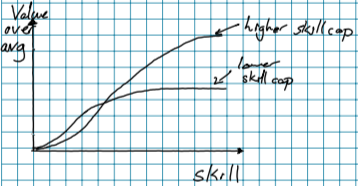EDIT: I'm only going to answer a few more questions, due to time constraints. I might eventually come back and answer more. I still appreciate getting replies with people's thoughts on things I've written.
I'm going to do an AMA on Tuesday next week (November 19th). Below I've written a brief description of what I'm doing at the moment. Ask any questions you like; I'll respond to as many as I can on Tuesday.
Although I'm eager to discuss MIRI-related things in this AMA, my replies will represent my own views rather than MIRI's, and as a rule I won't be running my answers by anyone else at MIRI. Think of it as a relatively candid and informal Q&A session, rather than anything polished or definitive.
----
I'm a researcher at MIRI. At MIRI I divide my time roughly equally between technical work and recruitment/outreach work.
On the recruitment/outreach side, I do things like the following:
- For the AI Risk for Computer Scientists workshops (which are slightly badly named; we accept some technical people who aren't computer scientists), I handle the intake of participants, and also teach classes and lead discussions on AI risk at the workshops.
- I do most of the technical interviewing for engineering roles at MIRI.
- I manage the AI Safety Retraining Program, in which MIRI gives grants to people to study ML for three months with the goal of making it easier for them to transition into working on AI safety.
- I sometimes do weird things like going on a Slate Star Codex roadtrip, where I led a group of EAs as we travelled along the East Coast going to Slate Star Codex meetups and visiting EA groups for five days.
On the technical side, I mostly work on some of our nondisclosed-by-default technical research; this involves thinking about various kinds of math and implementing things related to the math. Because the work isn't public, there are many questions about it that I can't answer. But this is my problem, not yours; feel free to ask whatever questions you like and I'll take responsibility for choosing to answer or not.
----
Here are some things I've been thinking about recently:
- I think that the field of AI safety is growing in an awkward way. Lots of people are trying to work on it, and many of these people have pretty different pictures of what the problem is and how we should try to work on it. How should we handle this? How should you try to work in a field when at least half the "experts" are going to think that your research direction is misguided?
- The AIRCS workshops that I'm involved with contain a variety of material which attempts to help participants think about the world more effectively. I have thoughts about what's useful and not useful about rationality training.
- I have various crazy ideas about EA outreach. I think the SSC roadtrip was good; I think some EAs who work at EA orgs should consider doing "residencies" in cities without much fulltime EA presence, where they mostly do their normal job but also talk to people.


Mike, while I appreciate the empirical predictions of the symmetry theory of valence, I have a deeper problem with QRI philosophy, and it makes me skeptical even if the predictions come to bear.
In physics, there are two distinctions we can make about our theories:
The classic Many Worlds vs. Copenhagen is a dispute of the second kind, at least until someone can create an experiment which distinguishes the two. Another example of the second type of dispute is special relativity vs. Lorentz ether theory.
Typically, philosophers of science and most people who follow Lesswrong philosophy, will say that the way to resolve disputes of the second kind is to find out which interpretation is simplest. That's one reason why most people follow Einstein's special relativity over the Lorentz ether theory.
However, simplicity of an interpretation is often hard to measure. It's made more complicated for two reasons,
The first case is usually not a big deal because we mostly can agree on the right language to frame our theories. The second case, however, plays a deep role in why I consider QRI philosophy to be likely incorrect.
Take, for example, the old dispute over whether physics is discrete or continuous. If you apply standard Solomonoff induction, then you will axiomatically assign 0 probability to physics being continuous.
It is in this sense that QRI philosophy takes an ontological step that I consider unjustified. In particular, QRI assumes that there simply is an ontologically primitive consciousness-stuff that exists. That is, it takes it as elementary that qualia exist, and then reasons about them as if they are first class objects in our ontology.
I have already talked to you in person why I reject this line of reasoning. I think that an illusionist perspective is adequate to explain our beliefs in why we believe in consciousness, without making any reference to consciousness as an ontological primitive. Furthermore, my basic ontological assumption is that physical entities, such as electrons, have mathematical properties, but not mental properties.
The idea that electrons can have both mathematical and mental properties (ie. panpsychism) is something I consider to be little more than property dualism, and has the same known issues as every property dualist theory that I have been acquainted with.
I hope that clears some things up about why I disagree with QRI philosophy. However, I definitely wouldn't describe you as practicing crank philosophy, as that term is both loaded, and empirically false. I know you care a lot about critical reflection, debate, and standard scientific virtues, which immediately makes you unable to be a "crank" in my opinion.